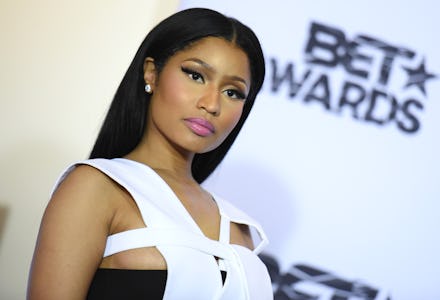This Was Nicki Minaj's Point Before Taylor Swift Made It All About Her

On Tuesday, Nicki Minaj got snubbed for the MTV Video Music Award's top prize. Her "Anaconda" video, which celebrates curvaceousness, voluptuousness and all things big booty, was deemed unworthy of a video of the year nomination — even though its bold take on female sexuality made it the most hotly debated video of 2014 and it broke Miley Cyrus' Vevo record for most views in 24 hours.
Tuesday evening, Nicki Minaj took to Twitter to express her disdain that videos celebrating women with "very slim bodies" consistently get nominated over those without.
Taylor Swift took it personally — she and Beyoncé were the only female nominees in that category — and when she responded, Twitter erupted into a frenzy. Everyone and their mother watched to see if the exchange would turn sour. But all this fascination with the exchange between the pop stars overshadows Minaj's very clear message: The media often overlooks larger-bodied women in order to celebrate an ideal of beauty that is slim and white.
It's easy to see why Swift took the attack personally. Her "Bad Blood" video is filled with slim women, most of them white. Swift did invite Minaj to join her on stage if she wins the best video VMA, but this single gesture will not help resolve our media's issues.
Minaj has pointed out these double standards before. The promotional photo for "Anaconda," which pictures Minaj from behind, crouching and wearing a thong, drew widespread criticism. Chuck Creekmur, owner of AllHipHop.com, wrote a piece for Mommy Noire claiming the image sent a bad message to impressionable girls like his daughter. "Now, the most popular, current Black female rapper starts overtly pushing her hyper-sexualized image again? Just my luck," he wrote.
Minaj responded on Instagram, posting a string of photos of thin girls' booties that created none of the same uproar, all with the caption: "Acceptable."
"Acceptable":
"Acceptable":
Followed by her own with the caption: "Unacceptable."
"Whenever black women own their sense of sexuality and it appears to not be controlled by the hetero-male gaze, the whole world gets into a tizzy," Mychal Denzel Smith wrote of the controversy for Feministing. "That's a scary thought in a world where black women's bodies are meant for our consumption, but only on the terms which everyone who isn't a black women gets to dictate."
White women do not get this pushback for showing their sexuality in this way. And the media, advertising outlets and the fashion industry regularly hold up thin, white women as the ideal standard of beauty and sexuality. We can see it in the way magazines photoshop female models to appear whiter and thinner, as has happened to Beyoncé, Gabourey Sidibe and Kerry Washington, among others.
This is the real issue. Media outlets manipulate images of women to fit an ideal, which detrimentally affects viewers who don't fit that image. Studies show that consuming this kind of skewed media can correlate with increased incidents of low self-esteem and eating disorders. According to Beauty Redefined, studies show that watching music videos specifically "increased the appearance and weight concerns of teen girls, with those findings being strongest among the black girls tested."
This is what Minaj hit on with the "Anaconda" video and her subsequent tweets about its snub. "I wanted to create a song that embraced curvy women," she told Complex of the song in December. When her video was snubbed, it was yet another message to curvy women: You don't matter — you don't even exist. This is exactly why Swift's offer to let Minaj join her on stage rang so hollow. Black, curvy women constantly live in the shadow of thin, white stars, and will continue to, until we start having the right conversations.